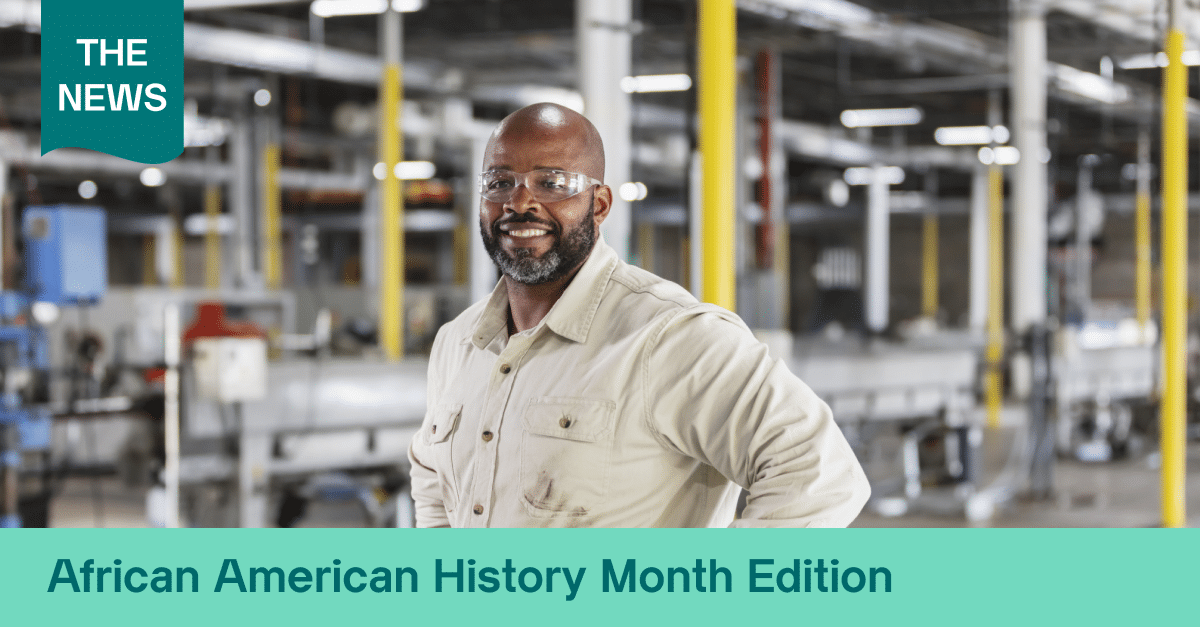
During Black History Month, many articles extol African Americans’ profound contributions to the manufacturing industry. However, more sobering reports paint a bigger picture wherein disparities still exist. Will AI technologies make it even less fair? Or is there another path? Read all about it in our regular round-up of manufacturing-related news.
From Super Soaker To Silicon Godfather
Most of us know the story of George Washington Carver – the renowned inventor who discovered 300 uses for peanuts (but, sadly, he did not invent peanut butter as the popular myth goes). He often tops those listicles published during Black History Month, highlighting African American innovators.
But there are so many others… Indeed, more people should know about NASA engineer and inventor of the Super Soaker®, Lonnie Johnson – who is now a climate tech entrepreneur.
And why isn’t Roy Clay Sr., the ‘Godfather of Black Silicon Valley’, more of a household name?
Not to mention these eight inspiring stories: ‘Celebrating the Pivotal Black Women Who Propelled the Manufacturing Industry Forward’.
Happily, many organizations – including AfroTech, People Of Colour In Tech, and Black in AI – are supporting the next generations of STEM dreamers. They are all working to make the future fairer – and, therefore, brighter.
Disparity Built On Disparity
In terms of manufacturing, the African American community was hit the hardest by the offshoring of manufacturing jobs that began in the 1970s. A famous 2017 report from the Alliance for American Manufacturing (AAM) laid it bare.
“The report, ‘Unmade in America: Industrial Flight and the Decline of Black Communities’, goes beyond current statistics that show national black youth jobless rates at 27 percent—nearly double that of white youths. The report examines the multi-generational impact of plant closings, outsourcing and housing discrimination in trapping black communities in concentrated poverty. While high joblessness is the obvious outcome of deindustrialization, other casualties include crime, educational inequity and fractured neighborhoods.”
“The spiral down in the 1970s continued into the 21st Century. More than 63,000 factories have closed since 2001. Over a 15-year period alone (between 1998 and 2013), an estimated 5.7 million manufacturing jobs were lost.”
But there’s hope, according to AAM President Scott Paul. “The key is getting policy right. We must invest in workforce development and America’s crumbling infrastructure programs, and vigorously fight against unfair trade practices if we’re to stop industrial flight and build up our middle-class. Now is the time for our lawmakers to invest, invest, invest.”
An AI-Inclusive Society For All
“For African Americans, the rise of this technology has benefits and drawbacks. The goal is to determine how to balance this reality and utilize technology to create an egalitarian and inclusive society,” according to ‘African Americans And The Revolutionary Potential of AI’.
“By addressing issues like discriminatory algorithms, lack of inclusion, and privacy concerns, AI-driven innovations can lead to significant improvements in healthcare, education, and community safety, narrowing societal disparities and fostering a more equitable society. With the dedication of pioneers and increased representation, coupled with ethical AI governance, the future holds promise for leveraging technology to create positive change and build a more inclusive society for all.”
Leaving No One Behind
Reinforcing this idea, a new in-depth McKinsey report can help boost the conversation around establishing an equitable future – especially in this era of reshoring.
“Generative AI has the potential to widen the racial economic gap in the United States by $43 billion each year. But deployed thoughtfully, it could actually remove barriers to Black economic mobility,” according to ‘The Impact Of Generative AI on Black Communities’.
The report breaks down what needs to be done to start deploying generative AI through an equity lens – from being vigilant and responsible in implementation (reskilling!) to ensuring democratic access.
“Gen AI could fundamentally change how most work is done and most services are provided. Early in gen AI’s trajectory, leaders have an opportunity to build equity and fairness into their developing gen AI strategies and associated applications, and to accelerate the closing of the racial gap. The aim: to have all people and communities – including Black communities, previously left behind by seismic shifts in tech – benefit from this amazing technology transformation. The time to act is now, using the foresight of past transformations as a guide.”
Let’s get to work.
Read ‘From Raw Material to Finished Product: A Life In Manufacturing‘ or reach out!






